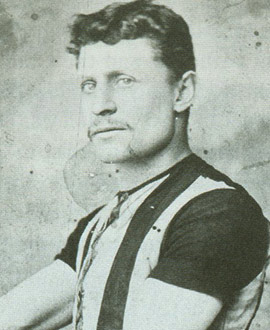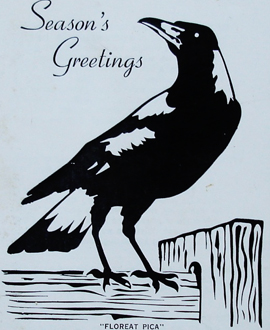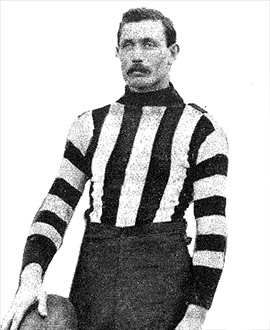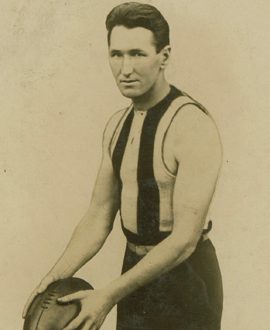The end of a footballer’s career can be a tricky time, and departures from clubs are often messy and undignified affairs.
But not for Dave O’Donoghue. He had been a solid, tough and dependable backman for 54 games spread over five seasons, when he was cut by the Magpies midway through the 1911 season. So did he sulk or whinge or moan or feel hard done by? Far from it. Instead, after receiving the letter from secretary Ern Copeland informing him of the club’s decision, he wrote a letter back to the footy club. It said in part:
“While regretting very much that I have appeared for the last time in the colours we are all so proud of, I must say that on the form I have shown this season your selection committee had no alternative but to act as they have done. Although I feel fit and well, I have for some unaccountable reason not been able to do well in matches, and am not a bit surprised at having been politely passed out.
“I desire to express to you, your committee, and the players my heartfelt thanks for the manner in which I have been treated during the six years I was connected with the club. Many happy memories of the Collingwood Club will always remain with me, and although not one of the chosen few, I shall regard the club as my haven of rest, and will be one more of the number of the old and loyal players that have made the Collingwood Club the envy of others by their constant attendance at matches. I hope that you and your committee will be long spared to look after the interests of the club, and that Collingwood may continue for all time to occupy that proud and honourable position in the football world that it has always held.”
Anyway you look at it, that is a remarkably generous response to the ending of your VFL career. But it typified the way O’Donoghue had gone about things ever since crossing to Victoria Park.
He was a star centreman with the Rose of Northcote club in 1905/06. He first came under wider notice when he was hospitalised after being knocked out and kicked in the stomach in a game against Yarraville in 1905. But it was mostly for the quality of his play that he began to win headlines.
By 1906, the Magpies had seen enough. And even though he was still a Rose of Northcote player, the club invited him on their historic tour of Tasmania in August of 1906 (during which the club’s theme song of ‘Good Old Collingwood Forever’ would be written). O’Donoghue was part of the touring party – interstate and country travel was seen as a massive perk in those days – and then returned to Rose of Northcote for their finals.
He took part in the Magpies’ pre-season games in 1907, and made his debut in the sixth round against Carlton. A few weeks later against St Kilda he won praise for his marking, and although he broke his finger late in the season he returned to the team and played extremely well in the losing semi-final against South Melbourne.
For the next two seasons he was a near-regular on either a half-back flank or in the back pocket. The newspapers regularly commented positively on his performances, with descriptions like “brilliant and reliable” (The Australasian, 1908), “brisk and resourceful, did the work of two men” (Argus 1909), and “in his prime was a tower of strength in the defence division” (The Herald). He was strong, quick enough and certainly brought a touch of aggression to his game, though he was accused of taking things too far with what several papers described as a “savage” attack in the 1909 final against South.
The 1909 season was his best, and he played every game. But he was hit by a bout of mumps in 1910 and lost a considerable amount of weight, as well as some fitness, form and, ultimately, his regular place in the side. He was hit by further injuries in 1911 but still played five of the first nine games before being let go. He was cleared to Leopold in the Metropolitan Association in July, where he played alongside his brother Alan, who the next season started a VFL career that would see him play 53 games with Richmond and South Melbourne.
Dave showed seemingly outstanding qualities in his letter to Ern Copeland after being cut from the list. Which makes what happened just six years later even more remarkable. He was charged with, and eventually found guilty of, several counts of embezzlement arising from his duties as a clerk in the Navy Department. He was initially sentenced to six years imprisonment before being released on appeal, but in August of 1917 his appeal was rejected and the original sentence confirmed. He continued to fight the charges and then sought special leave to appeal to the High Court, but that was refused.
That was a sad development in Dave O’Donoghue’s life story, and one that would have caught his many football friends by surprise. Because he’d attracted little but praise across a hard-working career and, as his farewell letter demonstrated, had won the respect of many. Spending a stint behind bars was no way to end that story.
- Michael Roberts





